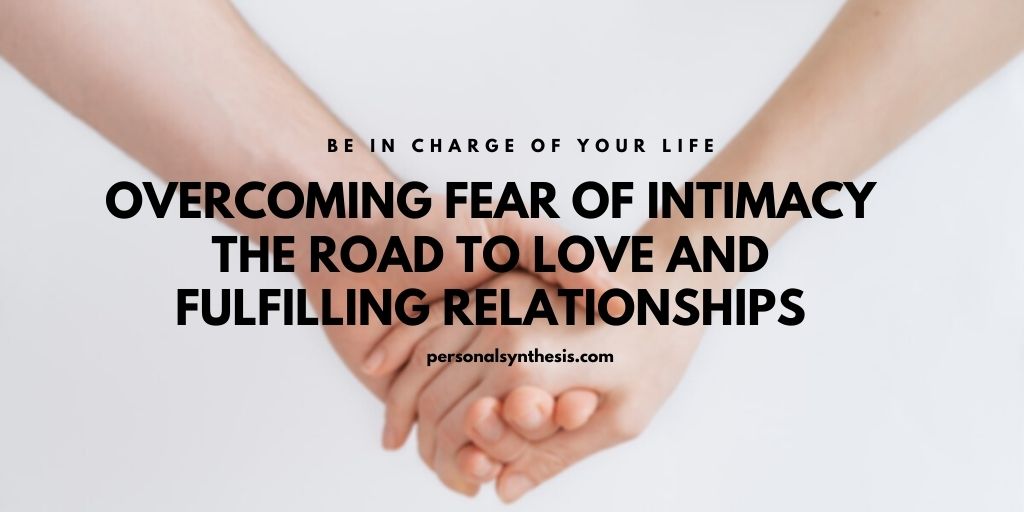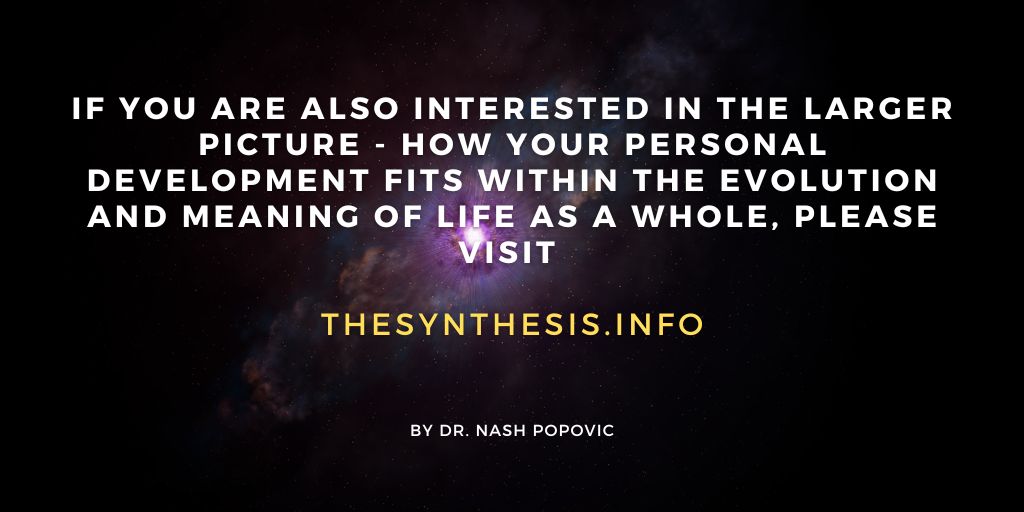Overcoming Fear of Intimacy – The Road to Love and Fulfilling Relationships

Written by Slobodan Kezunovic
Many of us grew up on Disney movies and fairy tales and whether we realize it or not, they have greatly influenced our views on love at a very early and impressionable age.
From Snow White and Cinderella to Beauty and the Beast, iconic fairy tales offer many subtle messages and lessons to be learned, but there is nearly always some type of love story at the heart of them.
Our young minds absorbed all the tales of princes and princesses until we internalized certain ideals of love and what our perfect relationship should look like, often believing that love always wins in the end no matter what.
Then our teenage years and early adulthood came along and brought with them our first heartbreak, and everything we thought we knew about love came crashing down like a house of cards.
For most people, this is a learning experience we eventually get over and put behind us, but sometimes this can prove to be much more difficult. One heartbreak may be followed by another, until we begin to grow weary of love and start to develop a fear of intimacy.
Perhaps you can identify with the above example, but childhood fairy tales are only the tip of the iceberg when it comes to how we develop our attitudes on love and intimacy as adults.
There are different reasons why people may struggle with intimacy in relationships, so let’s start from the beginning and take a look at what intimacy actually is.
What is intimacy?
It is the ability to genuinely share yourself, to achieve closeness and establish a connection with another human being.
There are different types of intimacy:
- Intellectual intimacy – sharing of thoughts and ideas and bonding through deep and meaningful conversations. The term for those who prioritize this type of intimacy is sapiosexual.
- Emotional intimacy – sharing of innermost feelings and forming an emotional connection.
- Sexual intimacy – sharing yourself sexually and indulging in a close sensual relationship.
- Experiential intimacy – sharing of common interests, activities and experiences that bring you closer and create a bond with another person.
As you can see, intimacy is not something we only share with our sexual partners but with friends and family as well. However, for the purpose of this article we will focus on the fear of intimacy in romantic relationships.
Underlying Fears at the Root of Intimacy Issues
Fear of intimacy is essentially the inability to share your thoughts and ideas, innermost feelings, sexual relations or other bonding experiences with your partner. In other words, it is a fear of sharing a deep emotional and physical relationship.
When we take a good look, however, we realize that fear of intimacy is actually a manifestation of other underlying fears developed throughout life. There are many variations of such fears that can play a factor, but intimacy issues are most commonly rooted in two broad, practically opposite types of fears.
Fear of Abandonment
Many people have experienced at some point a fear that their partner is going to leave them. It is also a fear that if we allow ourselves to let go and fall in love, we might be abandoned and left on our own to pick up the pieces of our broken heart.
In many cases, this type of fear stems from childhood experiences of being abandoned by a parent or caregiver, either physically or emotionally. In other cases, it can be the result of a romantic relationship in which a partner suddenly left you, was unfaithful, or in some other severe way abused and destroyed your trust.
Fear of abandonment can also be linked with low self-esteem and feelings of inferiority where we can simply feel unworthy of love, causing us to put up walls and shy away from forming a close connection with another person.
Fear of Engulfment
Fear of engulfment is practically the opposite of the worry that our partner is going to leave us. It is a fear of being controlled, dominated, losing our sense of self in a relationship and never being able to leave.
This fear is often the result of growing up with an overprotective parent who may have smothered you with love, but never let you express your individual needs or develop your own perspectives on life. Controlling parents often cross personal boundaries and impose feelings of guilt when their children don’t fulfil certain expectations or do as they are told.
Paradoxically, it can also be the result of not so close parents where the child learns to be self-sufficient at an early age. For those who learned to be independent and live on their own terms early in life, a close relationship with another person can seem like a threat to their freedom.
Fear of engulfment can also be developed later in life within a toxic relationship in which we are controlled, manipulated, or abused emotionally or psychologically.
Causes and Risk Factors
Although they can be developed later in life, intimacy issues are most often rooted in childhood experiences and then triggered by current circumstances and the intricacies of an adult relationship.
Fears of abandonment or engulfment can cause much confusion and frustration in a relationship if analysed solely based on present, day to day events. In order to deal with them properly, we must search within for a deeper root of the problem.
Let’s take a look at some childhood experiences that can play a role in developing intimacy issues as an adult.
Enmeshed Families
These are families that lack emotional and physical boundaries in which family members don’t respect each other’s privacy, and children are discouraged from becoming emotionally independent from their parents and siblings.
Children in such families are often made to feel guilty or selfish if they want to do something for themselves instead of always pleasing others. Parents’ lives are often centred around their children’s success and accomplishments, placing a tremendous amount of pressure on them to live up to their parents’ expectations and give up on their own dreams.
People who grew up in enmeshed families often feel smothered by a partner who gives them too much attention, or who comes off as needy or too clingy.
Emotional Neglect
Children with emotionally unavailable parents who don’t receive sufficient emotional support tend to develop intimacy issues, because they accept it as normal at an early age that people can’t be relied on emotionally.
We have a tendency to repeat the behaviour patterns we learn watching our parents interact with each other, so children of distant and emotionally unavailable parents tend to put up walls and repeat such behaviour with their own partners later in life.
Loss of a Parent
Loss of a parent through death, divorce or imprisonment can play a huge role in developing a fear of abandonment and intimacy issues.
Role Reversal
This can happen when a parent is indisposed due to illness and a child must “become the parent” and take care of the ill parent or siblings at an early age.
It can also happen in single-parent households in which the parent is always away because of work.
These situations often lead people to adopt a belief that they cannot rely on anyone in life but themselves, which can make it very difficult for a potential partner to tear down their walls and develop a deeper mutual trust.
Abuse
Any type of physical, mental or sexual abuse in childhood or adolescence can have devastating effects when it comes to development of intimacy issues.
This does not only involve the immediate family, but also any traumatic interactions with strangers, teachers, mean peers or bullies.
Common Behaviours Caused by Fear of Intimacy
There are many behaviours that can manifest when a person starts to grow closer with someone and their fear of intimacy begins to get triggered. Ironically, in many cases, the more the person values a particular relationship and truly longs for a connection, the more pronounced and intensified those behaviours can become.
Some specific, commonly seen behaviours caused by a fear of intimacy include the following.
Serial Dating
People often refer to this as fear of commitment, and it involves hopping from one relationship to another. As soon as the person with the fear feels that the relationship is becoming too close or intimate, they start looking for a reason to end it and get involved with someone else.
However, it is important to note that serial dating is not always a sure sign of intimacy issues. It is more often the result of an addiction to the dopamine rush we experience in novel situations that can bring us some reward. The sheer thrill of hooking up with somebody new is one of the surest ways one can feed their dopamine addiction.
Perfectionism
Perfectionism can work both ways. On the one hand, it can be turned towards yourself and make you feel like you don’t deserve to be loved. Like you have to be “perfect” to prove yourself worthy.
On the other hand, it can be directed at your partner. It can make them feel like they are never good enough and eventually push them away.
Difficulty Expressing Needs
Fear of intimacy can cause people to have trouble expressing their needs, wishes and desires. Similar to perfectionism, this can occur when someone feels undeserving of another’s affection or support.
Many times people expect their partners to “read their mind” and somehow know when they need or desire something. When this doesn’t happen and their needs go unfulfilled, they can believe it was done on purpose and interpret it as confirmation of their unworthiness.
This can cause a terrible vicious circle that leads to deterioration of trust within a relationship.
Sabotaging Relationships
There are many ways people can consciously or subconsciously sabotage their relationships. They can become very critical of their partner and pick fights over small or unimportant details.
This can also take on an opposite form where people make themselves unlovable by acting in strange ways, doing things they know will annoy their partner, or accuse them of things that have never occurred and are simply untrue.
Issues with Physical Contact
This is also an issue that can go both ways. A person who fears engulfment can become distant and start to avoid physical contact if they feel smothered.
Conversely, people who struggle with abandonment issues can become very clingy and express a constant need for physical contact and interaction.
All of the above behaviours can be a sign that you or your partner are battling with intimacy issues, but if you’re able to identify them and have the will to do something about them, there are things you can do to make your relationship work.
How Can You Cope With Your Fear of Intimacy?
Fear of intimacy can be overcome, but it requires some introspection and inner work. This involves identifying and challenging your negative attitudes and beliefs about the world, about others, and most importantly about yourself.
Accept Uncertainty
People who fear intimacy essentially fear the consequences of a relationship gone wrong. It’s a hard pill to swallow for many people, but there are no such things as guarantees in life, and human relationships are no exception.
Ultimately, every human relationship is somewhat of a gamble. It’s important to embrace uncertainty as a normal part of human existence and try to cultivate a more adventurous attitude towards life.
Working on building up your courage can help you with this tremendously. It’s not always easy, but it’s one of the most useful things you can do for yourself. You can find more on how to develop courage in the full Personal Synthesis guide.
Learn to Value Yourself
If you have problems with abandonment issues, it is important to acknowledge your self-worth. This is different than self-esteem which is about feeling good and confident about yourself, which can even just be a mask or turn into narcissism.
Self-worth is believing that you are intrinsically worthy as a person and bring value to the table in a relationship. When you feel worthy, you lower your fear of abandonment and rejection.
On the other hand, cut yourself some slack. Nobody is perfect, so you don’t have to constantly pressure yourself to live up to your highest standard.
Come to Terms with Your Past
It’s not always easy to face the past and look back at childhood experiences we may have buried deep within us. Furthermore, most of us don’t want to think negatively about our parents or our relationships with them.
Nevertheless, it is important to analyse our childhood experiences honestly if we want to zero in on the root cause of our fear of intimacy.
Check Your Inner Dialogue
How do you communicate with yourself? What do you tell yourself when you look in the mirror? Do you reinforce positive attitudes about yourself or do you always tend to put yourself down?
Do your best to tame your inner critic who is always quick to pass judgements. Be kind and compassionate toward yourself. Cultivating a positive inner dialogue is of great help in dealing with any type of fear, fear of intimacy included.
Re-evaluate Your Goals
What is it you really want out of life? What type of relationship are you actually looking for? Sometimes we enter a new relationship without actually knowing what we really want, and drifting can cause many intimacy issues to come to the surface.
After all, you can’t hit your target if you don’t know what you’re aiming for.
Be Patient
As with any fear, overcoming fear of intimacy doesn’t come overnight. So it’s important to give yourself time and appreciate every move forward, no matter how small it may be. Likewise, go easy on yourself if you suffer a setback.
Dealing with intimacy issues is a process, so remind yourself to stay on course no matter how long it may take, in order to secure yourself a better and happier future.
Advice for Dealing with a Loved One’s Fear of Intimacy
Having a partner who struggles with intimacy issues can be confusing and frustrating at times, but when those issues are recognized and their underlying causes are understood, there are ways we can help our partner deal with them and move our relationship forward.
Communication is the key to any successful relationship. Talk with your partner to identify their actual underlying fear so you can both take the right approach to resolving it. Is it abandonment? Is it rejection? Is it fear of being manipulated and controlled?
Create a safe environment in which your partner can feel like they can open up without becoming too vulnerable. On the other hand, if they fear being smothered, do your best to give them space to open up at their own pace without being pressured.
The most important thing to remember is to have patience and understanding. Let your partner know that you are there for them, and that working through whatever intimacy issue they may have is a team effort.
A fulfilling relationship is among the most wonderful things we can experience in life. If you wish to move forward in this area of your life, you can learn more about intimate relationships in the full Personal Synthesis guide.
Personal Synthesis is a handy ‘one-stop-shop’ that brings together all the areas that play a vital role in our everyday lives, from self-awareness to intimate relationships. The materials are the result of twenty years of research and have evolved through the experience of running numerous personal development programmes with the general public, young people and university students.
To learn more, please visit the Personal Synthesis materials that cover this and many other topics.
Slobodan Kezunovic
Slobodan Kezunovic has an academic background in business management and marketing, but has been a lifelong student of personal development and a promoter of dealing with life’s challenges in a healthy and constructive way. Psychology and human relations have always fascinated him and have been a key driver on his own road to personal development, believing that the only way you can change the world is by changing yourself. Slobodan works as a copywriter and editor with over 7 years of experience writing sales copy and marketing content for several industries. He has been following Dr Nash Popovic’s work closely and collaborates with him as a contributor to the Personal Synthesis project, with the goal of helping people live a more prosperous and skilful life.



